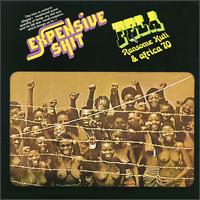
Fela Aníkúlápó Kútì was a Nigerian musician and political activist. He is regarded as the principal innovator of Afrobeat, a Nigerian music genre that combines West African music with American funk and jazz. At the height of his popularity, he was referred to as one of Africa's most "challenging and charismatic music performers". AllMusic described him as "a musical and sociopolitical voice" of international significance.

Olufela Olufemi Anikulapo Kuti, popularly known as Femi Kuti, is a Nigerian musician born in London and raised in Lagos. He is the eldest son of Afrobeat pioneer Fela Kuti and a grandchild of political campaigner, women's rights activist and traditional aristocrat Funmilayo Ransome-Kuti.

Tony Oladipo Allen was a Nigerian and French drummer, composer, and songwriter who lived and worked in Paris, France. Allen was the drummer and musical director of Fela Kuti's band Africa '70 from 1968 to 1979, and was one of the founders of the Afrobeat genre. Fela once stated that "without Tony Allen, there would be no Afrobeat". He was described by Brian Eno as "perhaps the greatest drummer who has ever lived". Later in life, Allen collaborated with Damon Albarn on several projects, including Gorillaz, the Good, the Bad & the Queen and Rocket Juice & the Moon.
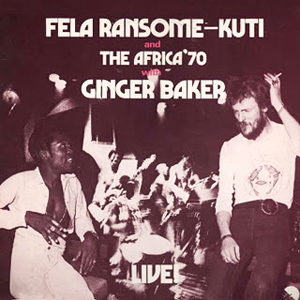
Live! is a live in-studio album recorded on July 25, 1971, by Fela Kuti's band Africa '70, with the addition of former Cream drummer Ginger Baker on two songs. It was released in 1971 by EMI in Africa and Europe and by Capitol/EMI in the United States and Canada. It was reissued on CD by Celluloid in 1987 and was reissued on CD in remastered form by Barclay with a bonus track from 1978.

Bamidele Olatunbosun Sosimi known as Dele Sosimi, is a Nigerian-British musician.
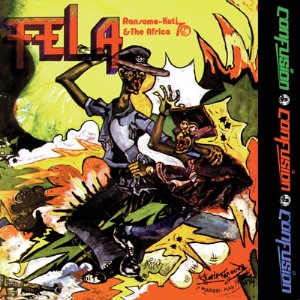
Confusion is a 1975 album by Nigerian Afrobeat musician Fela Kuti and his Africa 70 band. It was arranged, composed, and produced by Kuti, who recorded the album after choosing to emphasize his African heritage and nationalism in his music. Confusion is a commentary on the confused state of post-colonial Lagos and its lack of infrastructure and proper leadership at the time. Kuti's pidgin English lyrics depict difficult conditions in the city, including a frenetic, multilingual trading market and inextricable traffic jams in Lagos' major intersections.

Gentleman is a 1973 studio album by Nigerian Afrobeat musician Fela Kuti. It was written and produced by Kuti and recorded with his Afrika 70 band. The cover artwork's depiction of a monkey's head superimposed on a suited body is a reference to the album's title track, which Kuti composed as a commentary on the colonial mentality of Africans who adhered to European customs and clothing.
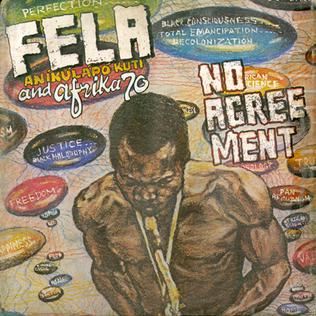
No Agreement is an album by Nigerian Afrobeat composer, bandleader, and multi-instrumentalist Fela Kuti. It was recorded in 1977 and originally released on the Nigerian Decca label.
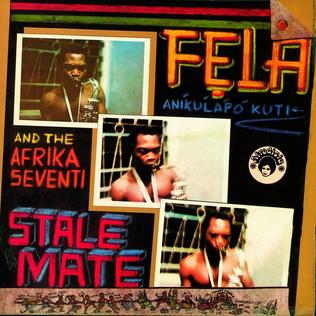
Stalemate is an album by Nigerian Afrobeat composer, bandleader and multi-instrumentalist Fela Kuti recorded in 1977 and originally released on the Nigerian Decca label.

Sorrow Tears and Blood is an album by Nigerian Afrobeat composer, bandleader, and multi-instrumentalist Fela Kuti. It was recorded in 1977 and originally released on the Nigerian Kalakuta label.

Shuffering and Shmiling is an album by Nigerian Afrobeat composer, bandleader, and multi-instrumentalist Fela Kuti. It was recorded in 1977 and released on the Nigerian Coconut label.

Unknown Soldier is an album by Nigerian Afrobeat composer, bandleader and multi-instrumentalist Fela Kuti, recorded in 1979 and originally released on the Nigerian Skylark label.

Fela's London Scene is an album by Nigerian Afrobeat composer, bandleader, and multi-instrumentalist Fela Kuti, recorded in England in 1971 and originally released on the Nigerian EMI label.

Open & Close is an album by Nigerian Afrobeat composer, bandleader, and multi-instrumentalist Fela Kuti, recorded in Lagos in 1971 and originally released on the Nigerian His Master's Voice label.

Shakara is an album by Nigerian Afrobeat composer, bandleader, and multi-instrumentalist Fela Kuti, recorded in Lagos in 1971 and originally released on the Nigerian EMI label.

Roforofo Fight is an album by Nigerian Afrobeat composer, bandleader, and multi-instrumentalist Fela Kuti recorded in Lagos and originally released on the Nigerian EMI label Jofabro in 1972.

Afrodisiac is an album by Nigerian Afrobeat composer, bandleader, and multi-instrumentalist Fela Kuti, originally released on the Nigerian EMI label in 1973. The album's four tracks were re-recordings of Nigerian 45s redone in London in 1972. The album features Kuti's first Nigerian hit "Jeun Ko Ku," which sold over 200,000 copies.

Teacher Don't Teach Me Nonsense is a 1986 studio album by Fela Kuti and the Egypt 80.

Ọmọ́rìnmádé Kútì known professionally as Made Kuti, is a Nigerian afrobeat singer, songwriter and instrumentalist. He released his debut album titled For(e)ward in 2021.
Bayo Martins (1932–2003) was a Nigerian jazz musician. A drummer and conga player, he is considered a pioneer of Afro-jazz. He was a member of some pioneering African musical ensembles.
